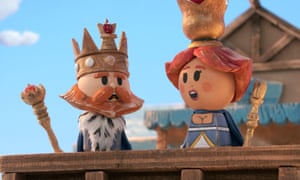For over 60 years, toy manufacturer Fisher-Price has brought joy to squealing children in thumb-sized plastic-figurine form through the Little People product line. Whether riding atop a fire engine, hanging around the barnyard, or filling a school bus for a field trip turned adventure, their limbless, peg-shaped bodies have grown into an icon synonymous with childhood and imagination. How outrageous, then, to contrast these totems of a more innocent time with such decidedly grownup material as boobs, butts, curse words, drugs, alcohol and full-frontal sexual activity!
That’s just about the full extent of the comedic subversion on offer in Crossing Swords, a show unabashed and proud of the sophomoric wit starting with its title. In a medieval setting still considered on-trend in a post-Game of Thrones world, diminutive playthings populate a feudal system of kings, queens, knights and peasants rendered with crude stop-motion animation. Their milieu forms another odd angle with their sensibility, which comes from our modern world of music festivals, crotchless underwear and bong usage. Either of these two juxtapositions – a cutesy aesthetic with a profane ethic, and the old-fashioned genre with the newfangled millennial world into which it’s being released – could sustain a 10-episode series if done with sufficient cleverness or creativity. Instead, creators John Harvatine IV and Tom Root half-ass both types of shtick in the hopes that together, they’ll total one entire ass. The writers behind a show this avowedly adolescent should know their gluteal mathematics better than that.
An adventure of this magnitude requires a fitting hero, a notion undercut by the meek rule-follower Patrick (voice of Nicholas Hoult, unrecognizable no matter how hard you listen for him). The pilot sends him into the ranks of the king’s squires-in-training, a mission realized first as a cop-show spoof in which the show quickly loses interest. (It’s here that the inept Patrick gets bumped from the captain’s Shit List down to her Shart List, which gives a damningly accurate impression of the level at which this writing operates.) For the most part, being a knight means attending to an unending series of crappy errands for the boobish king, whether that’s kraken disposal or security services at a monarchy-industry retreat that’s actually an orgy. The latter announces a running theme, come to think of it; circumstances often reveal themselves to be a shoddily thrown-together pretense to watch various characters grind their pelvises together like it’s a Rankin-Bass-produced porno.
Dulled as Crossing Swords may be, it still hazards the occasional stab at something more affecting or meaningful. More narrative forethought has been put into the trials of young Patrick than Harvatine and Root’s previous series, Robot Chicken, which used a similar animation style to lampoon Gen-X pop culture in sketch format. Spending 21 minutes on a single hi-jink allows the pair to break ground on real ideas, even if they don’t dig too deep afterward. Patrick and the King happen upon a utopian society at the top of a beanstalk and summarily ruin everything with their selfishness, a glancing blow against broad-strokes imperialism.
For more garbled social politics, one episode revolves around the local princess getting her first period and being branded a witch, a half-hour that gestures toward destigmatization of women’s health while constantly cracking jokes about how gross menstruation is.

The best bit tracks Patrick’s efforts to help a hoarder yeti (voiced wonderfully by Natasha Lyonne) make the psychological progress needed to declutter, successful in that it takes character more seriously than its limp attempts at timely commentary. The single compelling idea contained herein concerns Patrick’s unfitness for his time, as a meek-hearted person living in an era of solipsism and savagery. His siblings – a pirate, a rogue and a clown/scammer – constantly deride him as a ninny for his kindness and softness. But those qualities don’t just come in handy more often than brute force, they also provide him with a healthy skepticism once he’s entered the corridors of power.
A smarter show would burrow into the disillusionment as a rookie squire learns his dream is rotten on the inside, but there’s simply no time, what with all the circumcision gags that need to be made. Nothing against dick humor, which can be executed with finesse and ingenuity, like any other of the bluer schools of comedy. It’s just that in this case, the scripts pass pedestrian potty-mouthing off as the quippy intellect needed to get us comfortable at this low height of brow. This posed less of a stumbling block for the recent Disenchantment, another animated series mining laughs from a 21st-century look back at the 11th.
There’s a rigor to Matt Groening’s joke-craft and plotting, bred from decades of work on The Simpsons and Futurama, absent from the dashed-off exploits only slightly more cohesive than the sketch collections that got Harvatine and Root their start. Their latest project makes a jape out of its humble production values in comparison to the small-screen blockbusters that inspire it, and yet more than they realize, it barely holds together as TV.




















![[Book Review] The Blade Itself (The First Law Trilogy) by Joe Abercrombie](https://bendthekneegot.com/wp-content/uploads/2018/01/1516047103_maxresdefault-218x150.jpg)
















